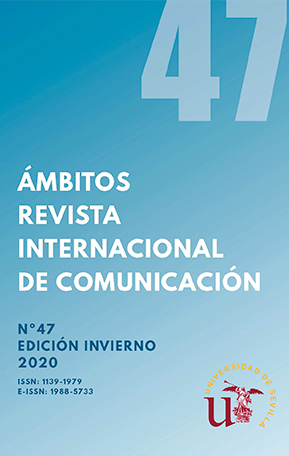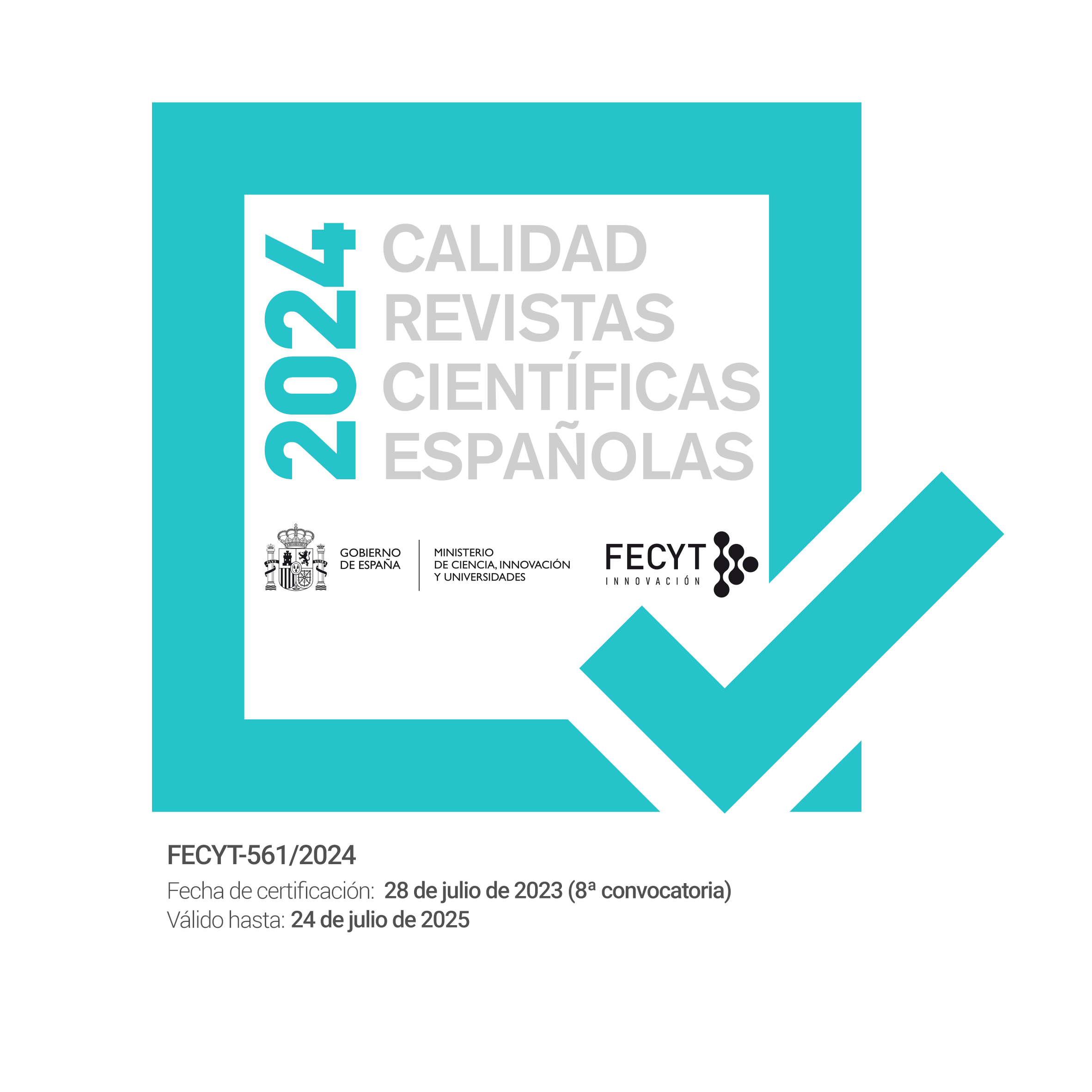Game rules vs. fandom. How Nintendo’s Animal Crossing fan-made content negotiates the videogame meanings
DOI:
https://doi.org/10.12795/Ambitos.2020.i47.11Keywords:
Animal Crossing, videogames, fandom, ideology, Cultural StudiesAbstract
This research reviews the ideologies present in the Nintendo’s videogame saga Animal Crossing and aims to discover how fans interpret them. The process involves an exploration of the online fanart of the videogame and its classification into reproductive, neutral or critical fandom, depending on the revised operating ideologies. Following, a content analysis and brief semiotic analysis have been conducted to interpret the meanings that fans elaborated and wanted to share with the community. As a result, this research shows that the fandom of Animal Crossing reinterprets the ideologies of the game producing a critique of struggles present in society against sexism and consumerism. However, some fanart is aligned with the neoliberal and sexist ideas that emanate from the canonical text. Thus, analysing fandom’s production is a worth way to discover how audiences interact with videogames and how they expand its meanings beyond the game.
Downloads
Metrics
References
References
Algaba, P. (2017). La aldea feliz. Un viaje a través de Animal Crossing. Bollullos de la Mitación (Sevilla): Héroes de Papel.
Batchelor, J. (2018). Global games market value rising to $134.9bn in 2018. Retrieved March 28, 2019, from GamesIndustry.biz website: https://www.gamesindustry.biz/articles/2018-12-18-global-games-market-value-rose-to-usd134-9bn-in-2018
Bègue, L., Sarda, E., Gentile, D. A., Bry, C., & Roché, S. (2017). Video Games Exposure and Sexism in a Representative Sample of Adolescents. Frontiers in Psychology, 8. https://doi.org/10.3389/fpsyg.2017.00466
Bogost, I. (2008). The rhetoric of video games. In K. Salen (Ed.), The ecology of games: Connecting youth, games, and learning (pp. 117–140). Cambridge: The MIT Press.
Brown, G., McLean, I., & McMillan, A. (2018). The Concise Oxford Dictionary of Politics (4th ed.). https://doi.org/10.1093/acref/9780199207800.001.0001
Clemente, J. J. (2014). El videojuego SimCity como recurso para la enseñanza-aprendizaje de la Geografía en Bachillerato. In M. C. Domínguez & M. . Cacheiro (Eds.), Diálogo entre culturas: Estrategias didácticas y tecnologías educativas. IV Congreso Pizarra digital. Madrid: UNED.
Concheiro, L. (2016). Contra el tiempo: filosofía práctica del instante. Barcelona: Anagrama.
Cuff, S. (2017). Now You’re Playing with Power: Nintendo and the Commodification of Nostalgia (University of Wisconsin Milwaukee). Retrieved from https://dc.uwm.edu/etd/1459
Dean, M. (2010). Governmentality: Power and rule in modern society (2nd ed.). London: SAGE Publications.
Del Moral Pérez, M. E., Guzmán Duque, A. P., & Fernández García, L. C. (2018). Game-Based Learning: Increasing the Logical-Mathematical, Naturalistic, and Linguistic Learning Levels of Primary School Students. Journal of New Approaches in Educational Research, 23(76), 31–39. https://doi.org/10.7821/naer.2018.1.248
Díaz Gutiérrez, E. J., Terrón Bañuelos, E., García Gordón, M., Rojo Fernández, J., Cano González, R., Blanco Jorrín, B., & Castro Fonseca, R. (2004). La diferencia sexual en el análisis de los videojuegos. Madrid.
Garcia, C. (2017). Game Therapy: Animal Crossing & Anxiety. Retrieved April 4, 2019, from Screen Therapy website: https://screentherapyblog.wordpress.com/2017/10/04/game-therapy-animal-crossing-anxiety/
Geraghty, L. (2015). Popular media cultures: Fans, audiences and paratexts. Hampshire: Springer.
Gómez-Gonzalvo, F., Molina, P., & Devís-Devís, J. (2018). Los videojuegos como materiales curriculares: una aproximación a su uso en Educación Física. Retos, 34, 305–310. Retrieved from https://recyt.fecyt.es/index.php/retos/article/view/63440/39542
Gray, J., Sandvoss, C., & Harrington, C. L. (2017). Fandom: Identities and communities in a mediated world. New York: NYU Press.
Hansen, A., Cottle, S., Newbold, C., & Negrine, R. (1998). Mass communication research methods. New York: NYU Press.
Hansen, A., & Machin, D. (2013). Media and communication research methods. Basingstoke: Palgrave Macmillan.
Hills, M. (2017). From fan culture/community to the fan world: Possible pathways and ways of having done fandom. Palabra Clave, 20(4), 856–883. https://doi.org/10.5294/pacla.2017.20.4.2
Io-Kain, N. (2015). Girl glasses: Avatars in Animal Crossing. Retrieved April 5, 2019, from Silverstring Media website: http://meminsf.silverstringmedia.com/identity/girl-glasses-avatars-in-animal-crossing/
Jackson, S. (2006). Interchanges: Gender, sexuality and heterosexuality: The complexity (and limits) of heteronormativity. Feminist Theory, 7(1), 105–121. https://doi.org/10.1177/1464700106061462
Jenkins, H. (2012). Textual poachers: Television fans and participatory culture (2nd ed.). New York: Routledge.
Kim, J. (2014). Interactivity, user-generated content and video game: an ethnographic study of Animal Crossing: Wild World. Continuum, 28(3), 357–370. https://doi.org/10.1080/10304312.2014.893984
Levis, D. (1997). Los videojuegos, un fenómeno de masas: qué impacto produce sobre la infancia y la juventud la industria más próspera del sistema audiovisual (1st ed.). Barcelona: Paidós.
Linden, H., & Linden, S. (2017). Fans and Fan Cultures. In Fans and Fan Cultures: Tourism, Consumerism and Social Media. London: Palgrave Macmillan UK.
Lindlof, T. R., & Tylor, B. C. (2017). Qualitative Communication Research Methods (4th ed.). Los Angeles: SAGE.
María, J., & López, C. (2006). La enseñanza de contenidos sociohistóricos y patrimoniales a través de los juegos informáticos de simulación. Treballs d’Arqueologia, 12, 111–126.
Mitchell, L. (2018). Ludopolitics: Videogames Against Control. Alresford: John Hunt Publishing.
Muriel, D., & Crawford, G. (2018). Video games as culture: considering the role and importance of video games in contemporary society. Oxford: Routledge.
Paredes-Otero, G. (2018). Análisis de la imagen de la mujer transmitida en las actuales carátulas de videojuegos. Ámbitos. Revista Internacional de Comunicación, 40, 190–199. https://doi.org/10.12795/Ambitos.2018.i40.23
Pérez Latorre, Ó. (2011). Géneros de juegos y videojuegos: una aproximación desde diversas perspectivas teóricas. Comunicació: Revista de Recerca i d’anàlisi, 28(1), 127–146. https://doi.org/10.2436/20.3008.01.81
Ramalho, J. E., Simão, F., & Paulo, A. B. D. (2014). Aprendizagem por meio de jogos digitais: um estudo de caso do jogo animal crossing. Ensaios Pedagógicos-Revista Eletrônica Do Curso de Pedagogia Das Faculdades OPET.
Ramos-Serrano, M., & Herrero-Diz, P. (2016). Unboxing and brands: Youtubers phenomenon through the case study of evantubehd. Prisma Social, 1, 91–120. Retrieved from https://revistaprismasocial.es/article/view/1315
Ramos-Serrano, M., Lozano-Delmar, J., & Hernández-Santaolalla, V. (2012). Fanadvertising y series de televisión. Comunicación: Revista Internacional de Comunicación Audiovisual, Publicidad y Estudios Culturales, 10, 1211-1223.
Rojo, T., & Dudu, S. (2017). Los videojuegos en la implementación de políticas de mitigación del cambio climático. Ambitos: Revista Internacional de Comunicación, 37. Retrieved from https://revistascientificas.us.es/index.php/Ambitos/article/view/9104
Stanfill, M. (2019). Exploiting fandom. How the media industry seek to manipulate fans. Iowa: University of Iowa Press.
Artwork used as study sample
mmDJ (February, 3, 2014). Animal Crossing: Gender Glitch. [Video]. Retrieved from https://www.youtube.com/watch?v=F-yZe2903i0
Aliensliveinme (March, 3, 2014). Animal crossing new leaf, cross dressing makes you run like a girl. [Video]. Retrieved from https://www.youtube.com/watch?v=0CX94k1I7ao
BanetteDoddles (June, 27, 2018). Comissions! [Re Post]. [Blog post]. Retrieved from https://aminoapps.com/c/animal-crossing/page/blog/commissions-re-post/eZVo_3Ec3u2bRBLMqBJ23870GELwbjpon
Compy Cubert (July, 10, 2018). Image. Computer Garden. [Blog post]. 2018. http://cubert.tumblr.com/post/175738819056
Cosmic kevvv (June, 25, 2013). Animal Crossing New Leaf:Crossgender Haircuts. [Video]. Retrieved from https://www.youtube.com/watch?v=LR4mIgBZet4
Finngamer (November, 19, 2015). Amiibo review: Animal Crossing, wave 1. [Video]. Retrieved from https://www.youtube.com/watch?v=gECIdXAErIA&t=216s
Heather (June, 9, 2017). Acnl Villager Memes. [Blog post]. Retrieved from https://www.x2u.club/acnl-villager-memes.html
Hotdiggedydemon (January, 22, 2016). Isabelle Ruins Everything (Animal Crossing Parody). [Video]. Retrieved from https://www.youtube.com/watch?v=VeWC9V2qH-8
Isabellefacts1 (February, 16, 2019). “isabelle fact 1: isabelle is a cannon lgbtq+ character.” [Tweet]. Retrieved from https://twitter.com/isabellefacts1/status/1096751934097088512
Joetheblogger (2011). Occupy Animal Crossing. [Blog post]. Retrieved from https://stfuconservatives.tumblr.com/post/11684091691
Kazenoabs0 (May, 7, 2015). Picture memes SLHqSL3u2. [Blog post]. Retrieved from https://ifunny.co/picture/SLHqSL3u2?gallery=tag&query=isabelle
Los Juegos de SaG (October, 13, 2016). ¡MALDITA ALCALDESA NEOLIBERAL!: Animal Crossing New Leaf para 3DS #JugamosaDobles #LaVenganzaDeLeven. [Video] https://www.youtube.com/watch?v=bO6z4xXJ2Kw&t=191s
Mayor Mori (October, 21, 2016). Nintendo Switch: Animal Crossing Trailer (fan made). [Video]. Retrieved from https://www.youtube.com/watch?v=lI1qZ_JVl2w
MissPolycysticOvary (2014). Oh,Mayor!. [Blog post]. Retrieved from https://www.deviantart.com/misspolycysticovary/art/Oh-Mayor-464985098
Nisego Channel (September, 17, 2015). Animal Crossing - Isabelle Fan Art. [Video]. Retrieved from https://www.youtube.com/watch?v=PS4gq1-oPtc
RandomMan (2014). “Image #558,726.” [Image]. Retrieved from https://knowyourmeme.com/photos/558726-animal-crossing
Starchie (2018). Super Smash Brothers Ultimate - Isabelle and Villager reunited. [Image] Retrieved from https://knowyourmeme.com/photos/1410214-super-smash-brothers-ultimate
Teamlpsandacnl (2019). Isabelle Alt. [Image]. Retrieved from https://www.memecenter.com/fun/7266234/isabelle-alt/
Downloads
Published
How to Cite
Issue
Section
License
Ámbitos. Revista Internacional de Comunicación is an open access journal, which means that all content is freely available at no charge to the user or their institution. Users may read, download, copy, distribute, distribute, print, search or link to the full text of articles, or use them for any other lawful purpose, without seeking prior permission from the publisher or author. This definition of open access is in accordance with the Budapest Open Access Initiative (BOAI).

Unless otherwise noted, all content in the electronic edition is distributed under a "Creative Commons Attribution-NonCommercial-ShareAlike 4.0 International License". You can consult the informative version and legal text of the licence here. This should be expressly stated in this way where necessary.
In case of acceptance of the manuscript, the authors cede the rights of the work for its publication to Ámbitos. Revista Internacional de Comunicación under the Attribution-NonCommercial-ShareAlike 4.0 International license contract (CC BY-NC-SA 4.0). The authors retain copyright and third parties are authorised to copy, distribute and make use of the work, provided they comply with the terms and conditions set out in the licence
- Cite the authorship and the original source of publication (journal, publisher and URL of the work).
- Do not use them for commercial purposes.
- If you remix, transform or create from the material, you must release your contributions under the same license as the original.
More information can be found at https://creativecommons.org/licenses/by-nc-sa/4.0/deed.es
- Abstract 1056
- PDF (Español (España)) 278


















